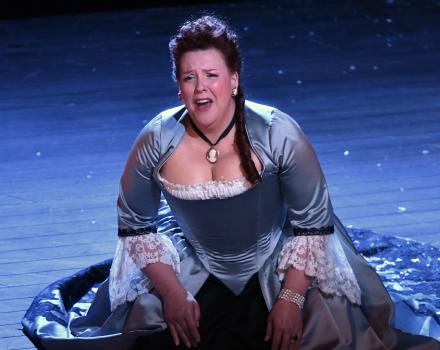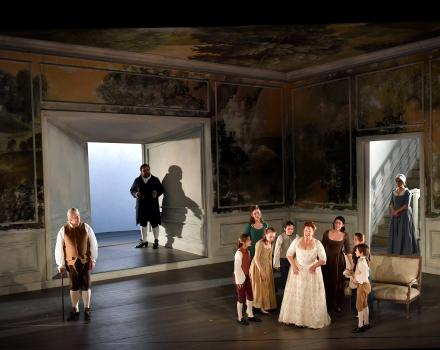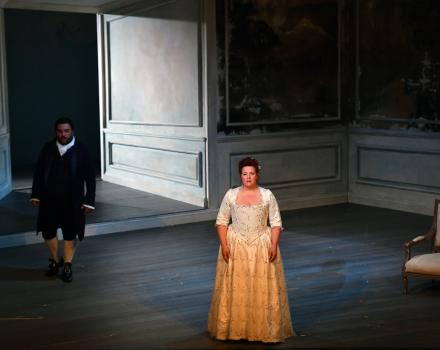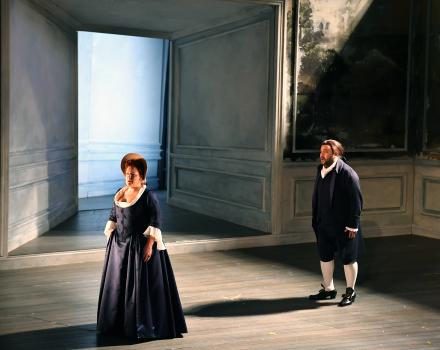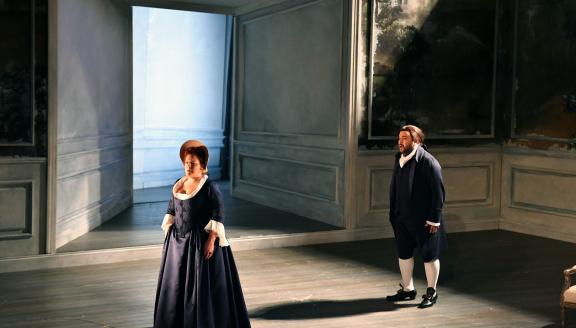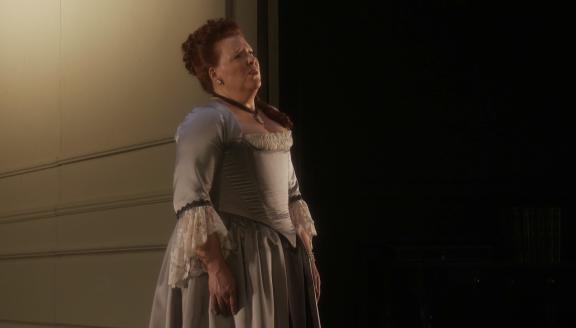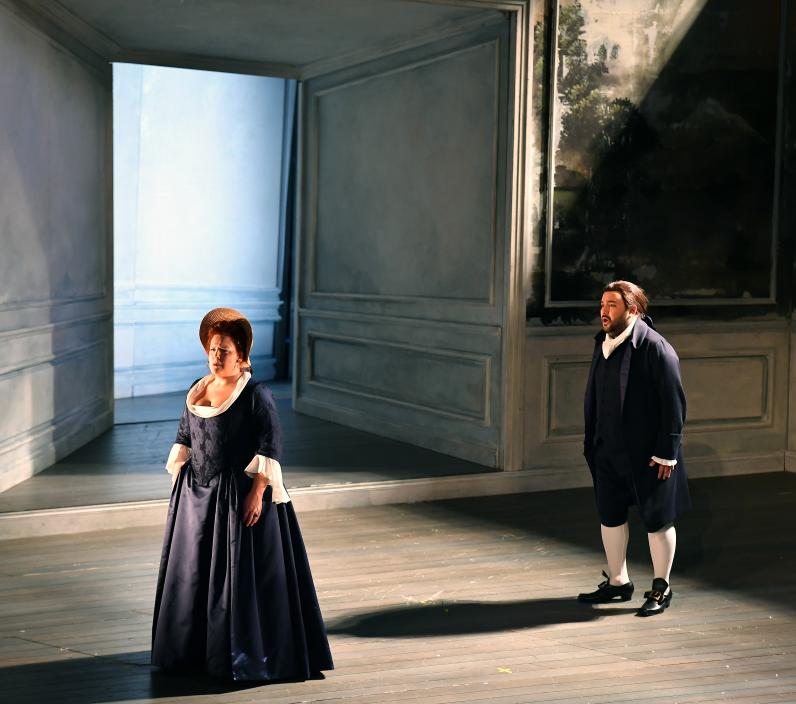

Charlotte only married Albert out of duty but continues to love Werther without admitting it to herself and even less to him. The young man despairs at seeing his advances rejected and will not taste the love that the young woman comes to confess too late.
Adapted from Goethe's novel, Jules Massenet's opera Werther is a jewel of French lyric repertoire. Opéra Orchestre National Montpellier Occitanie shares the sober and elegant staging by Bruno Ravella – his Rosenkavalier was recently enjoyed on OperaVision – and invites the famous Canadian contralto Marie-Nicole Lemieux to sing Charlotte for the first time, alongside a young and almost exclusively French-speaking cast conducted by Jean-Marie Zietouni.
Cast
|
Werther
|
Mario Chang
|
|---|---|
|
Charlotte
|
Marie-Nicole Lemieux
|
|
Albert
|
Jérôme Boutillier
|
|
Le Bailli
|
Julien Véronèse
|
|
Sophie von Faninal
|
Pauline Texier
|
|
Schmidt
|
Yoann Le Lan
|
|
Johann
|
Matthias Jacquot
|
|
Kätchen
|
Emma de La Selle
|
|
Brühlmann
|
Léo Thiéry
|
|
Maid
|
Lisa Martin
|
|
Children
|
Gabriel Bertrand, Marina Gallant, Charlotte Gleize, Naomi Renoir, Brunelle Sauvegrain, Nina Sauvegrain
|
|
Chorus
|
Chœur Dames Opéra national Montpellier Occitanie
|
|
Orchestra
|
Orchestre national Montpellier Occitanie
|
| ... | |
|
Music
|
Jules Massenet
|
|---|---|
|
Text
|
Édouard Blau, Paul Milliet, Georges Hartmann
|
|
Conductor
|
Jean-Marie Zeitouni
|
|
Director
|
José Darío Innella, original staging by Bruno Ravella
|
|
Sets
|
Leslie Travers
|
|
Lighting
|
Linus Fellbom
|
|
Costumes
|
Leslie Travers
|
|
Stage director assistant
|
Diane Clément
|
|
Production manager
|
Xavier Bouchon
|
|
Stage managers
|
Mireille Jouve, Anaïs Pélaquier
|
|
Chorus manager
|
Maya Lehec
|
| ... | |
Video
The story
Act I
At his home in the Hessian town of Wetzlar, the bailiff tries to teach his youngest children a Christmas song. His two drinking buddies, Johann and Schmidt, are amused at his struggle to practice Christmas songs in the middle of summer. The bailiff informs them that his eldest daughter, Charlotte, is getting ready for the evening's ball, and that the young poet Werther is to accompany her as Charlotte's fiancé, Albert, is away on business.
Arriving at the bailiff’s house, Werther is overwhelmed by the glorious summer day and pays tribute to nature through poetry. He is interrupted by the sound of children: it is Charlotte who is hurrying to give her young siblings supper before she leaves for the evening’s entertainment. Werther is completely captivated by what he sees. The bailiff says that he has become a widower, and that it is Charlotte who takes care of the children and the house now that her mother is dead.
After Werther and Charlotte have left for the ball, Albert suddenly arrives after having been away from town for six months. He is disappointed that Charlotte is not at home but asks Sophie, the bailiff’s second daughter, not reveal that he is back: he wants it to be a surprise for everyone the next day.
After Werther and Charlotte return from the ball, Werther confesses his love for her. But he becomes full of despair when Charlotte tells him what she promised her mother on her deathbed: that she must take care of the family and marry Albert.
Act II
It is a brilliant and sunny Sunday, and Albert and Charlotte have been married for three months. Together with other guests, they flock to the church to celebrate the golden wedding day of the pastor.
Werther observes Charlotte and her husband from a distance and he mourns the loss of what he has decided is the great love of his life. Albert tells Werther that he understands his despair and forgives him. Werther lies to Albert that he now sees Charlotte as nothing more than a good friend.
The two men are interrupted by the fun-loving Sophie who declares that as the air is full of merriment she’d like to celebrate and have the first dance with Werther. But Werther retires, ashamed at having lied to Albert about his love for Charlotte. When Charlotte arrives, Werther again declares his passion for her.
Charlotte, a little distraught, repeats that she must follow her duty and that she belongs to another. She demands that Werther leave town, but weakens and asks him to come back later, at Christmas time. Werther states that he will never return again.
Act III
Autumn has turned to winter, and on Christmas Eve Charlotte reads all the letters from Werther with despair and overwhelming emotion. Sophie tries to cheer her big sister up, but to no avail.
Werther suddenly arrives, and he and Charlotte exchange memories of the time before they were separated. Werther quotes from a passionate poem he was in the process of translating. The meeting is intense, but Werther leaves Charlotte abruptly.
Albert comes home and tells Charlotte he has heard from townsfolk that Werther has been visiting her. He also shows her a letter he has just received from Werther: ‘I'm going on a long journey. Will you lend me your guns?’ Charlotte senses a terrible looming tragedy and rushes away.
Act IV
That night, Charlotte makes her way to Werther’s house. In his room, she finds him wounded, but he forbids her to fetch for help. They finally embrace and she declares her love for him before he dies in her arms.
Insights
Interview with Marie-Nicole Lemieux
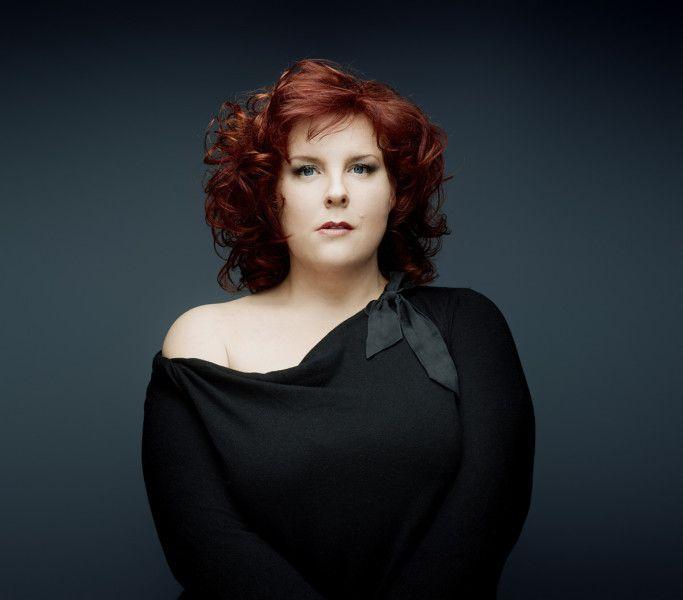
Interviewed by Benjamin François
You play the role of Charlotte, eldest daughter of a bailiff, 20 years old (congratulations!), betrothed and then married to Albert, Werther's lover: a positive and radiant character par excellence. What is your view of this emotionally-rich character?
Marie-Nicole Lemieux : I have a number of dream roles - Delilah, Charlotte and Carmen - and Charlotte is the last of them. It has taken time for my voice to be ready, as Charlotte is written in a higher range than Carmen. I am happy to be doing it now - at twenty (laughs!) - with a solid musical footing. I have always considered my voice as an instrument; not as something set in stone but adaptable.
Werther is one of my favorite operas. While I was at conservatoire, it was the only one that I listened to at least three times following the score just for the theatrical pleasure of this opera. What touches me about Charlotte is her great humanity. She is a real character, I understand her completely; her values, her maternal side, her filial affection and that quiet strength that attracts Werther in spite of herself. These are touching qualities. All this makes me think of the matriarchy that we have in Quebec, I think back to my mother, to these women beaming with joy and at the same time very grounded and aware of their duties. So yes, I've always felt very close to Charlotte. I feel for her torments, in her love for Werther, and at the same time in her inability to live with the weight of her decision. As he leaves, Werther becomes an masculine ideal for Charlotte, a fantasy of what could have been.
With Karina Gauvin and twelve other great Quebec singers, you recently took part in the ambitious project of the ATMA Classique label to record the entire works of Jules Massenet, i.e. more than 300 pieces! But I imagine you've know Charlotte's great tunes long before that?
I have been singing L’Air des lettres and Va, laisse couler mes larmes, since I was at the conservatoire. It's everything else - the big scenes and the more rarely heard arias - that I still had to learn. On the other hand, it was a great privilege to be able to participate in this complete recording of Massenet. Twenty-nine melodies, duets, trios (with Karina Gauvin and Julie Boulianne - a dream trio!) and magnificent quartets (like the Chansons des bois d’Amaranthe cycle) kept me going artistically during the pandemic and made me love Massenet even more. I understand him even better now as a composer too. In the light of this partly unpublished repertoire, I rediscovered in Werther an opera which is passionate, sensitive and mystical at the same time, served by a great composer who knew so well how to write for singers.
What is it precisely about this opera that allows you to say that Massenet has treated Werther musically and vocally differently from his other operas?
Massenet always knew exactly what he wanted. When you look at a score by Massenet, he is almost as demanding of his performers as Verdi because he notes absolutely everything. In just two pages of the aria, Va, laisse couler mes larmes, he writes as many tips as possible for the singer and it is a real challenge to follow all these annotations. And as I am something of a 'good girl’ with a total respect for the score, I am often dissatisfied by certain editions which gloss over all these instructions. Massenet is very demanding in this way, and when you do everything as instructed, it works perfectly. Maybe he didn't trust his singers completely? We can for sure say that Massenet must have loved female voices passionately; just think of Charlotte, Manon or Cinderella!
Imagine if Charlotte and Werther had got together: can you imagine their future relationship? Would it have worked?
I've already thought about a happy ending in which Albert marries Sophie and Charlotte marries Werther! There are several options. I am sure the ending would be happier if the opera were set today. Everyone would get therapy, Werther would take medication, Charlotte would do counselling for guilt management and everything would be fine! But if we stay in the 19th century, it's very different. I think they would go off together, but Charlotte would feel terribly guilty after a while about her mother. It would be very Judeo-Christian of her, but it's a character trait that is very present in the female figures of this century. She mentions it several times in the opera: she would not have been able to bear the weight of the guilt. As Werther is not a stable personality, I think it is impossible to imagine a happy ending under these conditions, and Charlotte would have ended up like Clara Schumann in visiting her Robert at the Psychiatric Institute in Endenich. The price to pay would be a very heavy one for Charlotte.
Gallery
